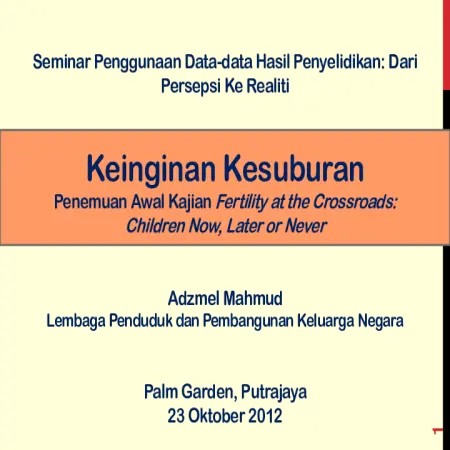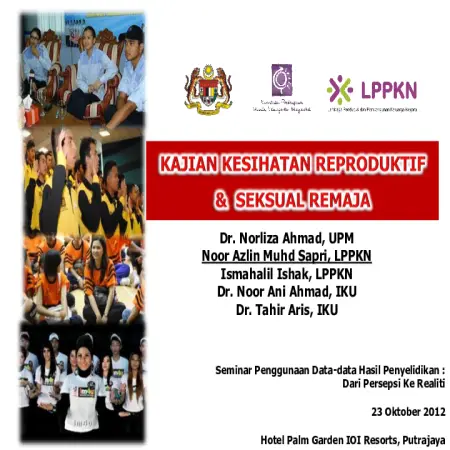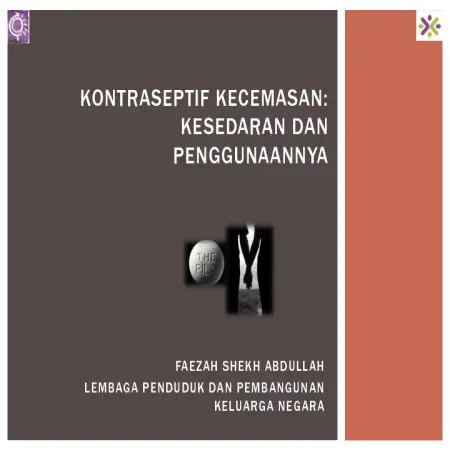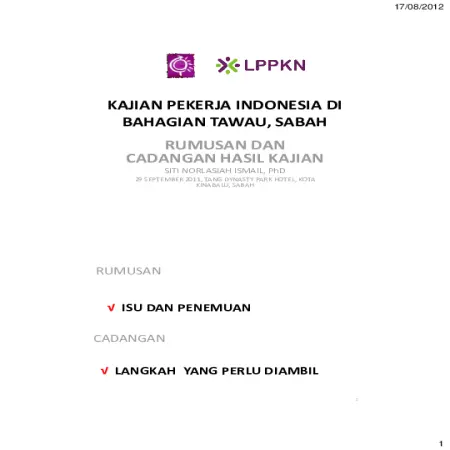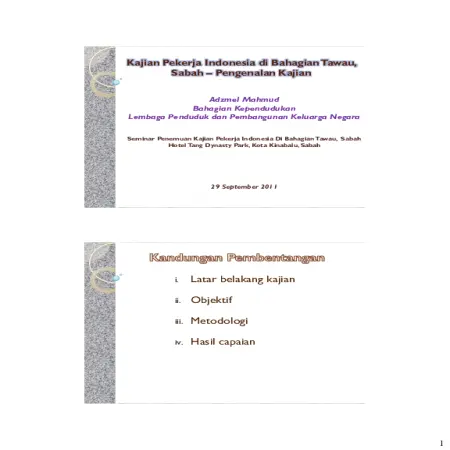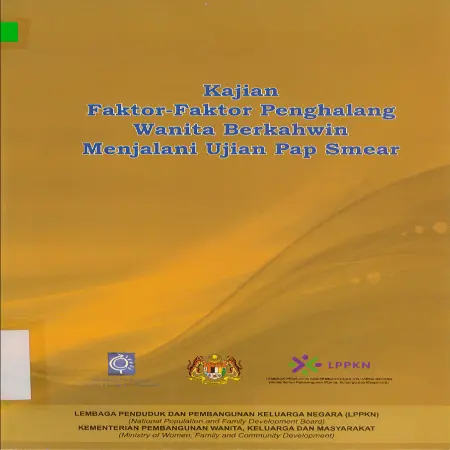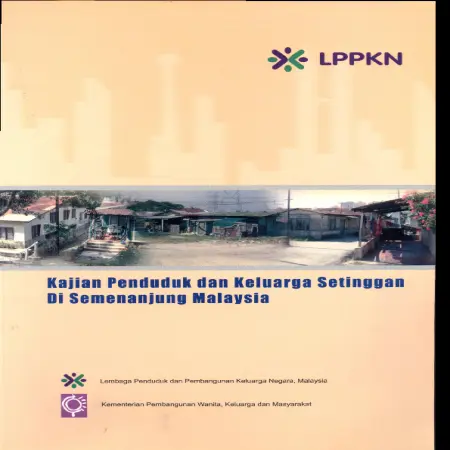Browse by Type
|
|
Keinginan kesuburan
Item Type: Conference or Workshop Item
Editor:
Year: 00/00/2012
Abstract: The decline in fertility rates in Malaysia is happening rapidly and it is expected that the rate will reach the replacement level (replacement level = 2.1) in 2015. A woman's desire/decision to have a child has a direct impact on the fertility rate and population growth. Thus, the study aims to identify the factors that influence women's desire to have children or do not need to be implemented. Data and Methodology: This paper presents the preliminary findings of the study Fertility at the Crossroad: Children Now, Later or Never conducted by LPPKN in 2012. This study uses a cross -sectional survey design method with a focus on women in the reproductive age group. 15-49 years working in the public sector in Kuala Lumpur, Putrajaya and Selangor. The method of data collection was through face -to -face interviews and self -administered using a questionnaire. Through stratified sampling method, a total of 98 public sector agencies were selected. To achieve the objectives of the study, the data obtained were analyzed using Descriptive Statistics, Chi Square and Logistic Regression (Forward LR Method). The dependent variable studied was the desire to have children (0 = do not want more children, 1 = want more children). While there are nine (9) independent variables studied namely age, ethnicity, education level, job grade (Management and Professional/Support), income, number of childbirths, pregnancy history (miscarriage/stillbirth/abortion), fertility problems and The husband lives far away. Findings: In total, a total of 1,898 data for women working in the public sector were analyzed. A total of 75.9% of respondents have a desire to have children. The results of Chi -Square analysis showed that the variables of age, ethnicity, income, number of births, pregnancy history, fertility problems and husbands living far apart had a significant relationship with the desire to have children. However, there is no evidence to suggest that post grade has a relationship with childbearing desire. Logistic regression test (Forward LR Method) showed that 57.8% of the variation in women's desire to have children can be explained by four independent variables, namely fertility problems, ethnicity, age and number of births. Conclusion: The results of the study found that women's desire to have children can be considered high. To support women's desire to have children, various forms of assistance/support should be provided by the employer/government. Among the main assistance/support needed are childcare centers at work, holiday facilities to care for sick children, subsidized childcare costs and full-paid facilities for children in need of special care.
|
|
|
|
|
|
Kajian kesihatan reproduktif & seksual remaja
Item Type: Conference or Workshop Item
Editor:
Year: 00/00/2012
Abstract: The increase in reproductive and social health issues among adolescents has been hotly debated both nationally and internationally. Every day, Malaysians are presented with news on adolescent misconduct, especially those involving cases of abortion and out -of -wedlock pregnancies. Therefore, a specific study to look at the level of reproductive and sexual health of adolescents and the factors that influence it was conducted based on the results of the national level of adolescent health research. Methodology this cross -sectional study was conducted in 2010 using secondary data from the Adolescent Health Screening Form (BSSK/R/1/2008) which was filled by trainees of the National Service Training Program (NSTP) in 80 NSTP camps throughout the country. To achieve the objectives of the study, the analysis used is descriptive analysis, chi -square test and logistic regression using SPSS software. The parameters studied included socio-demographic characteristics (gender, age, ethnicity and level of education) and social characteristics (risky behavior, history of abuse, anti-social behavior, substance abuse, religion, and family relationships). While there are nine (9) SRH issues that were studied, namely masturbation, watching pornography, extramarital sex, multi -partner sex, STIs, homosexual tendencies, homosexual relationships, pregnancy and abortion. Results A total of 23,231 data were analyzed. Of these, a total of 22,750 respondents aged 18-24 years were screened for the purpose of study analysis. The results of the analysis showed that the issue of watching and reading pornographic material among adolescents recorded the highest percentage (39.5%) followed by masturbation (28.5%) and extramarital sex (6.5%). All socio -demographic factors studied had a significant relationship with extramarital sex, homosexual predisposition and abortion (p <0.05). Risk factors for extramarital sex are the age group of 20-24 years (OR = 2.710, SK95% 1.967, 3.759), risky behavior (OR = 30.495 SK95% 19.683, 47.427), involvement in substance abuse (OR = 12.33 SK95% 8,051, 18,891), anti-social (OR = 2,615 SK95% 2,206, 3,100) and ever abused (OR = 1,726 SK95% 1,389, 2,145). While the appreciation of religion is a protective factor for adolescents where the study found that adolescents who appreciate religion are twice as likely to have sex compared to adolescents who do not appreciate religion. There is no evidence to suggest that familial relationship variables influence adolescents to have sex. Conclusion overall it can be concluded that adolescent reproductive and sexual health issues need to be given serious attention. This is because the results of the study show that the trend of extramarital sex among adolescents which is a key indicator of the level of adolescent reproductive and sexual health issues has increased from 2.2% in 2004 (MPFS-4) to 6.5% in 2010. Therefore, multisectoral cooperation programs are needed to address this issue. The implementation of intervention programs should also be focused on high-risk adolescents such as having risky behaviors, anti-social and involved in cases of substance abuse. The planning and preparation of the program must also take into account the concepts and teachings of religion practiced in Malaysia through an approach that can be accepted by adolescents. Further studies need to be conducted more extensively taking into account other factors that have yet to be explored.
|
|
|
|
|
|
Kontraseptif kecemasan: kesedaran dan penggunaannya
Item Type: Conference or Workshop Item
Editor:
Year: 00/00/2012
Abstract: Emergency contraceptive (EC) is one of the methods of contraception used after unprotected sex. With proper use, this method of emergency contraception can help reduce the problems of unplanned or unwanted pregnancies that have been frequent in recent times. The objective of this study was to identify women’s awareness of emergency contraceptive methods and their level of use. The research method involved the distribution of questionnaires to 1000 women, aged 15 to 49 years, who attended programs organized by NPFDB. Data collection and analysis was carried out using SPSS 11.5 software. The chi -square test was used to study the relationship between the sociodemographics of the respondents and the variables studied. The coverage of the study consisted of 84% Malay women, and was followed by Indians (9%) and Chinese (6%). The majority of respondents (43%) were in the range of 25 to 34 years, with a mean age of 33 years. Contraceptive use among respondents was found to be 26.3%, of which 98% were married women. The study found that women’s awareness of EC and its level of use was low, being only 29% and 3.9%, respectively. The chi -square test results showed that the level of awareness of EC increased with age (p <0.05). In addition, more highly educated women were found to have heard of EC (p <0.05) compared to low levels. Most EC users are from the married group. Nearly 70% of women who are using contraceptives are found to have used EC. Among women who have never used EC, only 21% are interested in using it in the future. However, the majority (70%) support this service provided at NPFDB. The lack of exposure on EC results in the number of women interested in using it being low. Therefore, NPFDB and related parties need to enhance promotional activities, advocacy and learning of emergency contraceptive methods, in addition to other methods, so that the community knows about it and can use it during emergencies.
|
|
|
|
|
|
Kajian pekerja Indonesia di Bahagian Tawau, Sabah: rumusan dan cadangan hasil kajian
Item Type: Conference or Workshop Item
Editor:
Year: 00/00/2011
Abstract: There are several factors for the entry of Indonesian workers to Sabah, among them is finding a job, earn a higher income as well as proximity to the country of origin. Recommendations and measures to be taken are to improve the enforcement of existing policies and laws, for example not being allowed to bring family members for unskilled and semi-skilled workers, prompt repatriation for foreign workers staying beyond the period (5 years) and employers bearing the cost of delivery come back. The next step is to curb the entry of illegal workers or immigrants, especially through illegal entrances (border control). Employers need to give priority to locals to work by giving higher wage rates or salaries. The government needs to set a minimum wage in every employment sector and plan workforce requirements updated. The government needs to encourage employers to move to mechanization and automation, especially for the plantation sector to reduce dependence on labor (unskilled and semi -skilled). Lastly, government should provide guidelines for the residence of foreign workers and facilities in the workplace as well as undergo regular monitoring by relevant agencies, and also encourage socialization with local residents. This presentation slide will describe the issues and suggestions that need to be taken as a result of the study of Indonesian workers in the Tawau Division, Sabah.
|
|
|
|
|
|
Kajian pekerja Indonesia di Bahagian Tawau, Sabah: pengenalan kajian
Item Type: Conference or Workshop Item
Editor:
Year: 00/00/2011
Abstract: The objective of this study is to identify the causal factors of entry and conduct socio-demographic analysis such as family, education, health, family planning practices, citizenship and socialization of Indonesian immigrants. The next objective is to study the perception of dependence on Indonesian workers as well as the impact of the presence of immigrants/Indonesian workers on the local population in terms of economy, security, family, culture, education, health, social and legal. The last objective is to identify the factors of hiring foreign workers, the process and costs of hiring, wages and employment, and the facilities provided by employers to foreign workers.
|
|
|
|
|
|
Kajian Penilaian Modul Pendidikan Kesihatan Reproduktif dan Sosial (PKRS) dalam kalangan Pelatih PLKN
Item Type: Research Report
Editor:
Year: 00/00/2011
Abstract: Adolescents are the future leaders of the country and have a huge influence on the social, economic and political situation of the country. However, with the presence of various social problems that plague teenagers today, it is feared that it will affect their future which in turn is detrimental to the country. The Ministry of Women, Family and Community Development (MWFCD) has taken the initiative by developing the Reproductive and Social Health Education Policy and Action Plan (PKRS) which aims to produce individuals who are knowledgeable and have a positive attitude in the field of reproductive and social health. Under this PKRS program, the National Population and Family Development Board (NPFDB) is one (1) of the agencies that implement the program. In line with the implementation of this policy, the National Service Training Council has agreed with MWFCD's proposal for PKRS to be implemented in PLKN. Following that, NPFDB has implemented one (1) Pre and Post Test Study to trainees to assess the level of knowledge and perception on reproductive and social health before and after the teaching of this PKRS module is conducted. This study also aimed to examine the sexual and reproductive behaviors of trainees.
This study was conducted in 2011 in a cross section on PLKN Trainees aged 17 years and above in selected National Service Training Camps in Malaysia using independent random sampling. The total sample required was 1,038 people. The calculation of this sample size is based on an estimated 31,200 PLKN trainees who are required to attend training using Confidence Interval (95%), Margin of Error (1.5%) and Prevalence of Having Sex Out of Wedlock Among Adolescents (6.5%), (Naing L, 2006). Questionnaires were developed according to the needs and objectives of the study. One-third of the questions of this questionnaire were adapted from an international study, namely the Youth Risk Surveillance Survey, 2011 but adapted according to the objectives of the study and the culture of the community in Malaysia. The method of questionnaire administration was self administered. The scope of the questionnaire covers three (3) domains namely demographic information, knowledge and attitudes towards reproductive and social health as well as adolescent sexual behavior. A total of 1,300 pieces of assessment forms (pre and post -test) were distributed during the first teaching session of the module. Of that number, only 1,063 forms were received for analysis. After the initial analysis was conducted, it was found that there were some questions that were not fully answered by the respondents. Therefore, the data analysis will vary according to the number of participants who answered for each section. In total, a total of 1,063 respondents were successfully covered in 13 training camps nationwide.
The results of the descriptive analysis showed that the respondents consisted of 57.8% male adolescents and 42.2% female. The majority of respondents were aged between 17 to 19 years (95.6%) with a mean age of around 18 years. Based on the ethnic composition, 66.7% are Malays, 15.3% Chinese, 4.2% Indians and 13.8% are other ethnicities including Sabah and Sarawak Bumiputera. Most respondents have SPM education (95.6%) and are unmarried (99.6%).
The overall findings of the study can be summarized that the level of respondents' knowledge on reproductive and sexual health increased significantly (p <0.05) after undergoing the PKRS module with an increase in mean knowledge score of 7.04±2.2 (before undergoing the module) to 9.17±2.1. A total of 71.1% of respondents obtained a score of 9 out of 12 items (75.0%) and above after undergoing the module. There was a significant change in attitudes (p <0.05) on reproductive and social health after undergoing PKRS training. This indirectly shows that this PKRS module seeks to help respondents change their attitudes in a more positive direction.
A total of 10.4% of respondents admitted to having had sex. The mean age of having sex for the first time is about 15 years. 45.5 percent of them had sex with more than one partner. Only 2.1 percent admitted to being sexually attracted to the same sex with 18.2% of them admitting to having had same -sex sex.
|
|
|
|
|
|
Kajian faktor-faktor penghalang wanita berkahwin menjalani ujian pap smear
Item Type: Research Report
Editor:
Year: 00/00/2010
Abstract: Cervical cancer is the second most dangerous threat to women that not only lead to a loss of pregnancy, but can even be life threatening. 12.9 percent of all cancer deaths among women are also due to this cancer. Unfortunately, 80% of women who are first diagnosed with cervical cancer are already at serious stage and cannot be treated properly even though cervical cancer screening programs such as Pap Smear have existed since 1943. Statistics released by the Ministry of Health Malaysia through the 2003 National Cancer Registry Report showed, even after the implementation of the Pap Smear program, the incidence rate of cervical cancer has increased where in 1990 the incidence rate was 13.3 per 100,000 women compared to 19.7 per 100,000 women in 2003. This illustrates that the Pap Smear program in Malaysia is not comprehensive and not practiced by those who need it which is women who have started sexual activity.
Therefore, the National Population and Family Development Board (LPPKN) has conducted a study in relation to cervical cancer screening or Pap Smear test. This study aimed to provide information on sociodemographic characteristics and reproductive history, women’s awareness on pap screening tests, women’s risk perceptions of cervical cancer, women’s attitudes towards the importance of Pap Smear testing and prevalence of Pap Smear screening test practice. This cross -sectional study was conducted in the Klang Valley, Melaka, Perak and Terengganu using purposive sampling. The total sample was 1000 people. The study population consisted of once married women aged between 20-65 years. This includes married women, widows and widowers. The conditions for rejecting the sample are ineligible women, such as unmarried women, non-Malaysian citizens and women who have had cervical cancer.
The collection of research data is through interviews based on the text of the questionnaire provided. Respondents will be interviewed by interviewers who have been trained to obtain accurate information. To achieve the objectives of the study, the analysis used is descriptive analysis, chi-square test and t test. Therefore, based on the analysis that has been conducted, the prevalence of female Pap Smear test is 55.2 percent. Respondents showed a positive attitude when asked about the importance of Pap Smear test compared to other examinations, many of whom thought that this test was very important (92.7 percent). Only 4.2 percent considered the Pap Smear test not important and there were a few who could not provide certainty about its importance (3.1 percent). Not many can measure the risk they are facing to get cervical cancer as 377 (41.5 percent) people are unaware of the cancer risk they are facing. However, there were a total of 276 (30.4 percent) women who were confident that they were not at risk at all. Only 7.7 percent received a high risk of this cancer, moderate risk (5.6 percent) and low risk (14.9 percent).
|
|
|
|
|
|
Kajian Pendapat Remaja dan Isu Sosial : mencari penyelesaian
Item Type: Research Report
Editor:
Year: 00/00/2010
Abstract: Introduction of Reproductive and Social Health Education Policy and Action of Plan (PKRS) has been developed which aims to produce individuals who are knowledgeable and have a positive attitude in the field of reproductive and social health. Under the PKRS program, the National Population and Family Development Board (NPFDB) has been given the mandate as the main agency in implementing the program. One of the programs is the Life Skills Program for teenagers which uses two (2) modules, namely the Cakna Diri Module (I’m In Control) and the Kesejahteraan Hidup Module. The purpose of this module developed is to improve adolescents' skills in aspects of reproductive health in order to avoid high-risk behaviors that lead to several problems such as premarital pregnancies, sexually transmitted diseases and HIV. Therefore, an opinion poll was conducted to see the general view on social issues of adolescents, especially from the aspect of reproductive health and the implementation of the Life Skills Program for adolescents.
|
|
|
|
|
|
Kajian Penduduk dan Keluarga Setinggan di Lima Bandar Utama, Semenanjung Malaysia
Item Type: Research Report
Editor:
Year: 00/00/2001
Abstract: This study is to collect information on the population and squatter families from the demographic and socio-economic aspects. A total of 1.423 dwellings in slum areas has been carried out censorship. Of this amount, a total of 7.310 identified household members and 1,308 ever married women aged 15 to 49 years were selected. The study was conducted in five major cities in Peninsular Malaysia, namely, Ipoh, Sungai Petani, Petaling Jaya, Kuala Lumpur and Johor Bahru. The study covers the demographic information, housing and environmental conditions, the labor force participation, aspects of migration and relocation, neighborhood issues and community life, family interaction and communication between family members, reproductive health and health practices, child care issues, aspirations / hope respondents about their children's education in the future, and interaction respondent / husband with parents.
|
|
|
|
|
|
Kajian kesan pendatang asing ke atas penduduk tempatan: 'satu tinjauan di Mukim Setapak dan Ulu Kelang'
Item Type: Research Report
Editor:
Year: 01/12/2000
Abstract: This study was conducted to gather information on the impact of immigrants on the local aspect of demographic, economic, social, education, employment, health and safety. By using qualitative methods, fieldwork has successfully interviewed include locals, foreigners, government officials and community leaders. The study found that over 70 percent of respondents say that the locals immigrants chose Malaysia because of the economic opportunities and family ties with the local people. In addition, a stable political situation is also a cause of withdrawal immigrants into Malaysia. Almost half of the immigrants use the health facilities provided by the government. This causes the local population to resort to private clinics / hospitals that indirectly increase the cost of family expenses.
|
|
|
|





